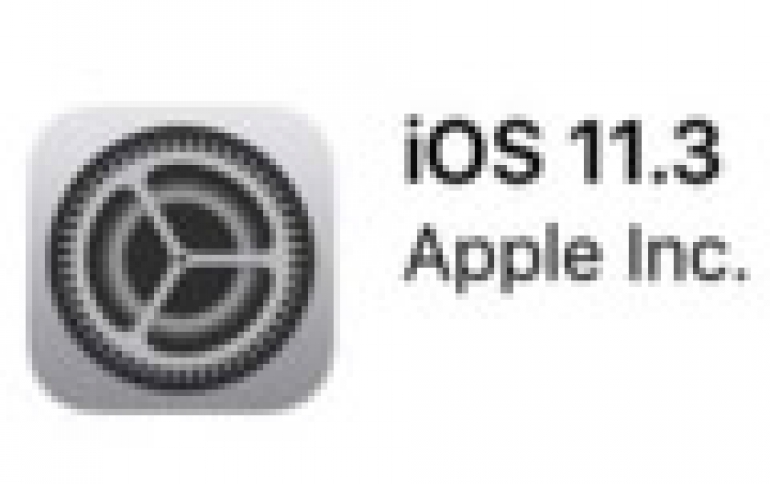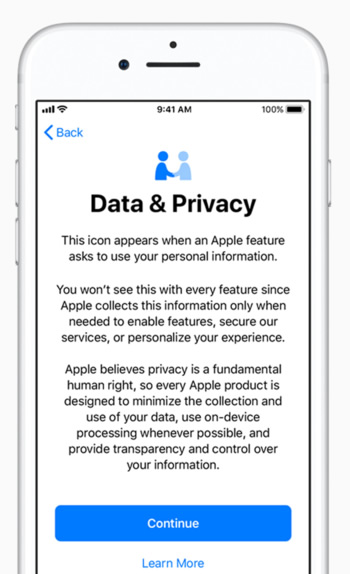
Apple iOS 11.3 Update Brings Privacy Tools Ahead of GDPR
Apple has released the iOS 11.3 update for its devices, which introduces, among the typical enhancements to the software, introducing new tools that will allow consumers to control how their data are used and deactivate their Apple ID accounts.
The privacy changes come as the European Union General Data Protection Regulation (GDPR) enters into force on May 25. It introduces stiff fines of up to 4 percent of global turnover for companies found to be in breach.
Apple said that users worldwide will see a new data privacy information page when they install the iOS 11.3 update on their iPhones. A new privacy icon and detailed privacy information will appear whenever Apple asks for access to personal information to enable features, secure Apple services or personalize an iOS experience. These changes also come to the macOS 10.13.4.

From May, Apple will introduce new privacy management tools on the Apple ID website allowing users to get a copy of all their data held by Apple, request a correction, deactivate or delete their account. Data portability is also a new right introduced by GDPR.
Facebook has also announced some privacy changes ahead of the entry into force of the EU law which is seen as raising standards worldwide as companies introduce changes globally. The company is also facing a huge fine if found violating a 2011 consent agreement with the U.S. Federal Trade Commission (FTC) to safeguard users' personal information.
Apple claims that contrary to Google and Facebook, which collect user data to serve them targeted advertising, its customers are not the product.
The iOS 11.3 update for phones and tablets also includes a toggle to disable a controversial feature that slowed down iPhones with older batteries to avoid random shutdowns.
The update allows apps to deliver AR experiences that use vertical surfaces like walls and doors, in addition to horizontal surfaces like tables and chairs, and more accurately map to irregularly shaped surfaces like circular tables.
Using computer vision techniques to find and recognize the position of 2D images such as signs, posters and artwork, ARKit is also to integrate these real world images into AR experiences such as filling a museum with interactive exhibits or bringing a movie poster to life.
In addition, four new Animoji bring iPhone X users' expressions to life as a lion, bear, dragon or skull. The A11 Bionic chip and TrueDepth camera give users the ability to record and send Animoji messages (and even create Animoji karaoke videos) using their voice and more than 50 different facial muscle movements.
Business Chat is a new way for users to communicate directly with businesses using the Messages app on iPhone and iPad. Business Chat will be available in beta in the U.S. When searching for a business in Maps, Safari, Search or Siri on iPhone and iPad, users will see the option to contact the business using Messages to ask a question about a product or service, or make a purchase using Apple Pay. These conversations can be continued on Apple Watch or Mac.
iOS 11.3 also brings a new Health Records feature, which helps patients of more than 40 health systems including Duke, NYU Langone, Stanford and Yale view their medical records from multiple institutions right from their iPhone. Health Records data is encrypted and protected with a passcode.
Additional iOS 11.3 features:
- Apple Music now streams music videos uninterrupted by ads. Users can watch new videos, classics or ones from their favorite artists back-to-back in new music video playlists.
- Apple News makes it easier to stay up-to-date on the most important videos of the day with a new Video group in For You, and improved Top Stories.
Commuters in Beijing and Shanghai can begin using Apple Pay on their iPhone and Apple Watch for a secure ride on Metro and bus lines.
Apple TV app, a unified place for iPhone, iPad and Apple TV users to discover shows and movies, will launch in Brazil and Mexico. - Brazil will gain Siri support on Apple TV 4K and Apple TV (4th generation)
- HomeKit software authentication provides a new way for developers to add HomeKit support to existing accessories
- Support for Advanced Mobile Location (AML) to automatically send a user's current location when making a call to emergency services in countries where AML is supported.





















